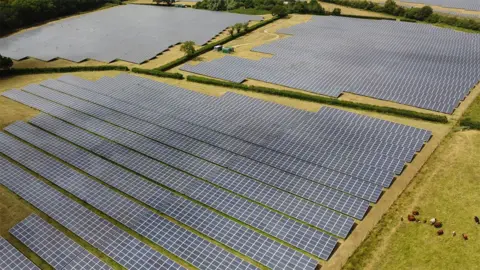Man bought private jet with borrowed council money
 BBC
BBCA businessman cheated a council out of tens of millions of pounds and went on a spending spree with the cash, an investigation has discovered.
Leaked documents reveal how Liam Kavanagh used Thurrock Council's money to buy luxury goods, including a yacht and a private jet.
The council has been made effectively bankrupt after investing £655m in Mr Kavanagh's solar farm business.
Mr Kavanagh's lawyers say all the payments were permissible.
They say they were approved by his company's finance team and auditor.
Thurrock is one of a number of councils that have got into financial difficulties since the coalition government gave local authorities more freedom to raise funds and invest in 2011.
Woking, Slough and Croydon have all been forced to stop all non-essential spending after losing public money on risky investments.
 Marin Ghe/JetPhotos
Marin Ghe/JetPhotosThe Audit Commission - a spending watchdog that stopped councils taking too many risks - was abolished in 2015.
Conservative-led Thurrock Council started investing cash with Mr Kavanagh's business Rockfire the following year.
The idea was that the council would get regular interest payments from the profits and its cash would be safe because it was secured against the value of the solar farms.
But the interest payments stopped after Mr Kavanagh wound up his companies and the estimated value of the solar farms is less than the council thought.
Administrators are now selling the solar farms and Thurrock is facing a £200m shortfall on its investment.
The council has been forced to cut services and put up council tax.
Vickki Jarmyn has run a dance group for people with learning difficulties in the area for the past 14 years. But her £7,000 grant has been cut and the group is under threat.
"It's just an ongoing battle," she said. "How can you just take something from people that thrive in that situation, that are safe and comfortable? How can you just do that?"
The investigation - by BBC Panorama and The Bureau of Investigative Journalism - has revealed how the value of Liam Kavanagh's solar farms was inflated to persuade the council to invest more cash.
Rockfire had one of its solar farm portfolios revalued in 2018. The company gave valuers a power price of £61.45 per megawatt hour (MWh), but the average power price for the portfolio at the time was £46.92/MWh.
In 2020, Mr Kavanagh was told by staff that the average power price was predicted to be £41.70/MWh. But he insisted the valuers should be given an inflated price of £62/MWh, which they seemed to accept.
Gavin Cunningham, a former investigator with the Serious Fraud Office, told Panorama that supplying inaccurate energy prices was potentially fraudulent.
Mr Cunningham said: "The effect of that will be that you end up with a far greater valuation of the overall portfolio of solar farms than is actually the case. And anyone relying on that information is going to be misled by it."

By 2018, Thurrock had already invested more than half a billion pounds in Mr Kavanagh's business.
The inflated valuations convinced the council to invest a further £130m - but the money never reached the solar farms.
Leaked documents from Rockfire reveal how Mr Kavanagh spent council money on himself instead.
A ledger of payments shows £12m went to a company that bought Liam Kavanagh's private jet.
There are also payments totalling £2m for his Bugatti Chiron car and £16m for his yacht Heureka.
A further £40m disappears into a bank account labelled "other".
An email Mr Kavanagh sent in 2020 suggests he always planned to spend council cash on himself. It says: "These funds… will be used to create a new family investment office and to create wealth for years to come. This has always been my plan."
Mr Kavanagh is no longer living in the UK.

The Millionaire who Cheated a Council is on BBC iPlayer now and will be on BBC One at 20:00 BST (22:40 BST in Wales)

His lawyers said the transactions were all legal and that he was entitled to spend the council money on whatever he wanted.
They said there were no restrictions on how the investments were to be used, the solar assets were not overvalued and the power prices submitted were honest predictions.
Mr Kavanagh said Thurrock had approached him about the investments and they had produced significant income for the council over a number of years.
He said: "I have never misled Thurrock Council during the course of those investments. It was always my understanding that Thurrock Council conducted its own independent due diligence into investments."
Last month, a report by Essex County Council criticised Thurrock for its risky investment decisions and failure to make proper checks. The report also highlighted the role played by the council's then chief financial officer, Sean Clark, in its disastrous investment strategy.
As well as the Rockfire investments, Mr Clark also invested council cash in other companies that went bust. Mr Clark did not respond to Panorama.
The new council leader, Andrew Jeffries, apologised for the "the shocking and unacceptable failures" of the past.
He said the council was taking all appropriate action to recover the council's financial position and to protect vulnerable residents and essential services.
The Government says it has offered Thurrock financial help. It has also established the Office for Local Government to improve accountability, help detect emerging risks of failure and support local authorities.
